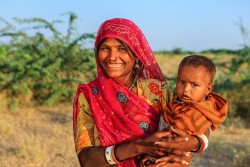Reflections on global health for newborns and mothers
Andrew Lynk MD MSc FRCPC D.Litt.(Hons)
President, Canadian Paediatric Society
I recently attended the Saving Every Woman, Saving Every Child Summit in Toronto. Several CPS members were invited, including Dr. Jenn Brenner (Calgary), who was also an expert panelist.
The Canadian government has pledged $3.5-billion for 2015-2020 to address priority issues around maternal, newborn and child health in 10 low-income countries. Calls for proposals will be launched in September 2014, and the federally-funded Canadian Network for Maternal Newborn and Child Health, and the Grand Challenges Canada will be involved. The three priority areas will be around: strengthening health systems; improving nutrition; and reducing the burden of leading diseases (see www.canada.ca/mnch).
Neonatal mortality and stillbirths have received little attention from the world until now. I highly recommend the recent Lancet Every Newborn Series, which sets out bold, but achievable post-2015 targets for newborn mortality and stillbirths for the next two decades. The World Health Organization has also recently published Every Newborn: An Action Plan.
The day of birth is the most dangerous for mothers and infants. Almost half of maternal deaths and neonatal deaths occur at the time of labor and the day of birth. Worldwide, 44% of deaths in children younger than 5 years occur in the first month of life.
The number of women who die each year during pregnancy or childbirth has dropped substantially—from 525,000 deaths in 1990 to 290,000 in 2013. The major causes of maternal deaths include hemorrhage, hypertension, sepsis and botched abortions. Globally, deaths among children under 5 have gone from 12 million in 1990 to 6.6 million in 2012.
However, the annual reductions in neonatal deaths, now at 2.9 million per year, have been slower. Preterm and small-for-gestational-age births, asphyxia and infections are the major killers and causes of long-term disabilities in neonates.
The estimated annual 2.6 million stillbirths were invisible in the original Millennium Development Goals (MDGs), and the rates of reduction have been slow.
Thirty to 70 percent of these deaths could be prevented in the next 10 years, with scaling up coverage of low tech, high impact evidence-based interventions. These include contraception services, and antenatal, intra-partum and postnatal packages. Some of these interventions will involve more births occurring at affordable, accessible, quality local health facilities. More than 50% of women in low-income countries currently give birth at home without a skilled attendant present.
Most of these 5.5 million stillbirths and neonatal deaths are never officially recorded, reflecting a societal and health worker acceptance of the issue. To count deaths is critical to reducing them. Only half of the world’s newborn babies get a birth certificate. The President of Tanzania likes to question his regional governors on their individual maternal newborn child health metrics during his visits to their areas. This gets their attention!
There are huge challenges to scaling up the necessary coverage. National governments in many low-income countries spend more on annual military budgets than health and education combined. Poor governance and corruption bleed away precious resources. The reach of big tobacco may undo some of our hard fought gains in newborn health. There is a huge need for training of health care workers, and frontline and mid-level managers.
It will be essential, and difficult, to address quality and equity gaps. Developed countries need to transition from non-sustainable aid programs, to capacity building partnerships, fair trade practices, and help with regional conflict and security issues. Nothing threatens the lives and well being of children and their families like violence, be it domestic or national.
There is no vaccine for poverty. Without food security, enhanced female education and jobs, saving newborns only to live a life of deprivation will challenge our moral intentions. Children must not only survive, they must thrive.
We often forget about fathers. However, the evidence suggests that if thoughtfully engaged, fathers may have a substantial impact on improving quality, accessible care for their wives and newborns.
Lastly, the upcoming Canadian investments in global newborn health represent an opportunity for our CPS sections and members to get involved, and make a difference. Let’s start talking about this later this month in Montreal. Stay tuned, and stay engaged.
Copyright
The Canadian Paediatric Society holds copyright on all information we publish on this blog. For complete details, read our Copyright Policy.
Disclaimer
The information on this blog should not be used as a substitute for medical care and advice. The views of blog writers do not necessarily represent the views of the Canadian Paediatric Society.
Last updated: Jun 5, 2014

